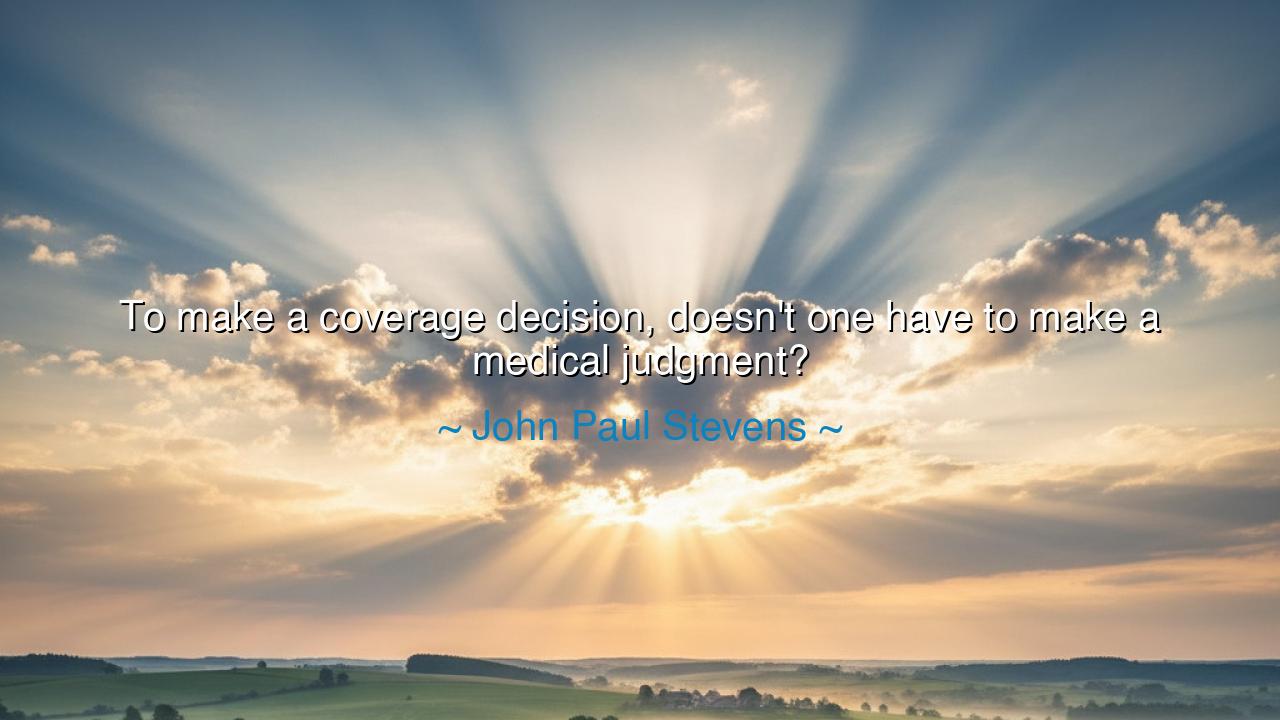
To make a coverage decision, doesn't one have to make a medical






In the voice of Justice John Paul Stevens, the words resound: “To make a coverage decision, doesn’t one have to make a medical judgment?” At first they seem rooted in the courts, entangled with law, insurance, and policy. Yet beneath their surface lies a profound truth about power, knowledge, and responsibility. For what is coverage but the gate to healing, and what is judgment but the bridge between need and remedy? His question pierces the veil of bureaucracy and asks us: who holds the right to decide when a human being may receive care?
In these words, Justice Stevens reminds us that the act of declaring what shall be paid for, what shall be denied, what treatment shall be deemed worthy, is not a neutral act. It is no mere calculation of dollars and ledgers, no clerical note buried in paperwork. It is, in essence, a medical judgment, for to deny coverage is to deny treatment, and to deny treatment is to shape the course of a person’s health, their pain, their hope, even their survival. Those who make such decisions sit, knowingly or not, at the boundary between life and suffering.
History itself bears witness to this struggle. In the late 20th century, as managed care and insurance companies rose in power, many physicians cried out against the interference of administrators who had never placed a stethoscope upon a chest. One need only recall the case of Murray v. UnitedHealth, where delays and denials of treatment were challenged on the grounds that financial gatekeepers were, in effect, usurping the role of the physician. The courts, at times, wrestled with Stevens’s very question: if one decides whether a man receives chemotherapy, is that not the same as choosing his medical path? Thus, the judge’s words do not merely echo in legal halls—they echo in hospital rooms, where real lives tremble in the balance.
Imagine, too, a soldier on the battlefield of ancient times. If the healer says, “This wound must be stitched, or the warrior will perish,” but the quartermaster says, “We have no thread to spare,” who has rendered the greater judgment? Is it not the quartermaster, though no healer, who has decided the fate? So it is with coverage decisions. The one who controls the means wields the power of the physician, whether they admit it or not. Stevens, with his question, strips away the illusions and demands that we see the truth: coverage is never separate from care.
The lesson, my children, is one of responsibility. Those who carry the burden of deciding what shall be given or withheld must never deceive themselves into thinking their role is distant or purely financial. Their decisions pulse with moral weight. To declare, “This is not covered,” is to pronounce a kind of sentence on a life. It is to wield a silent but mighty power. And if they must wield it, let them wield it with the humility of physicians and the compassion of healers, not the coldness of accountants.
For us, who are not judges of law or masters of insurance, the teaching is still urgent. In every station of life, when we decide what resources we will give to others—our time, our attention, our labor—we are making judgments that affect their well-being. We must not pretend these choices are neutral. To neglect a friend’s cry for help, to deny aid to one in need, is not simply an absence of action—it is a decision, a judgment, that shapes another’s fate.
Therefore, let us live with greater awareness. When you face a decision where human need stands before you, remember Stevens’s challenge. Ask yourself: “Am I, in this choice, making a judgment that reaches into another’s health, another’s spirit, another’s life?” And if you are, then let compassion be your guide. For true justice is not cold and blind—it is warm with mercy, guided by wisdom, and brave enough to see the hidden weight of every choice.
Thus, Justice Stevens leaves us a torch, a reminder that coverage and judgment are bound together. May we carry it into every field of life, so that no decision we make is stripped of its humanity. For to recognize the sacred weight of our choices is the first step toward becoming not only fairer judges, but more compassionate souls.






AAdministratorAdministrator
Welcome, honored guests. Please leave a comment, we will respond soon